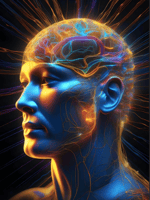Cognitive development is the cornerstone of learning and growth, impacting every aspect of our...
What is Brain Fog?
.jpg?width=299&height=450&name=Brain%20fog%20child%20(2).jpg) Brain fog is a term commonly used to describe a state of mental confusion, lack of focus, and diminished cognitive function. It’s not a medical condition itself, but rather a symptom associated with various underlying issues such as stress, sleep deprivation, poor diet, and certain medical conditions like chronic fatigue syndrome and fibromyalgia. Brain fog can significantly impact daily life, affecting an individual’s ability to perform tasks efficiently, make decisions, and maintain productivity. Understanding brain fog is crucial because it helps in identifying the factors that contribute to it and finding effective ways to combat it.
Brain fog is a term commonly used to describe a state of mental confusion, lack of focus, and diminished cognitive function. It’s not a medical condition itself, but rather a symptom associated with various underlying issues such as stress, sleep deprivation, poor diet, and certain medical conditions like chronic fatigue syndrome and fibromyalgia. Brain fog can significantly impact daily life, affecting an individual’s ability to perform tasks efficiently, make decisions, and maintain productivity. Understanding brain fog is crucial because it helps in identifying the factors that contribute to it and finding effective ways to combat it.
Symptoms of Brain Fog
The symptoms of brain fog are varied and can affect individuals differently, but they generally include cognitive, emotional, and physical manifestations. Cognitively, people may experience difficulty concentrating, forgetfulness, and confusion. For instance, someone might find it hard to remember appointments, misplace everyday items like keys, or struggle to follow a conversation. Emotionally, brain fog can lead to feelings of irritability, depression, and anxiety, making it hard to stay positive and motivated. Physically, symptoms can include headaches, fatigue, and a general sense of malaise. These symptoms can collectively impair one’s ability to function effectively both at work and in personal life, leading to decreased overall quality of life.
Detailed List of Symptoms.jpg?width=299&height=450&name=brain%20fog%201%20(4).jpg)
To provide a clearer understanding, here’s a detailed list of brain fog symptoms:
- Memory Problems: Frequent forgetting of names, dates, and important information.
- Difficulty Concentrating: Struggling to focus on tasks or follow conversations.
- Confusion: Feeling mentally disoriented or unable to think clearly.
- Mental Fatigue: Feeling mentally exhausted even after minor tasks.
- Lack of Motivation: Difficulty in initiating or completing tasks.
- Irritability: Increased sensitivity and frustration over minor issues.
- Depression and Anxiety: Persistent feelings of sadness or nervousness.
- Physical Fatigue: Constant tiredness that doesn’t improve with rest.
- Headaches: Frequent or chronic headaches, sometimes associated with stress or lack of sleep.
- Sleep Disturbances: Difficulty falling or staying asleep, leading to a lack of restorative rest.
How Cognitive Training May Help
.jpg?width=299&height=450&name=Happy%20child%20(3).jpg) Eliminating brain fog requires addressing its root causes, and cognitive training has emerged as an effective solution. Cognitive training involves structured exercises designed to improve various aspects of cognitive function, such as memory, attention, and problem-solving skills. By engaging in cognitive training, individuals can enhance their brain’s ability to process information, retain memories, and maintain focus. This targeted approach helps in reducing the symptoms of brain fog by strengthening the neural pathways involved in cognitive tasks, leading to improved mental clarity and overall brain health.
Eliminating brain fog requires addressing its root causes, and cognitive training has emerged as an effective solution. Cognitive training involves structured exercises designed to improve various aspects of cognitive function, such as memory, attention, and problem-solving skills. By engaging in cognitive training, individuals can enhance their brain’s ability to process information, retain memories, and maintain focus. This targeted approach helps in reducing the symptoms of brain fog by strengthening the neural pathways involved in cognitive tasks, leading to improved mental clarity and overall brain health.
Benefits of Cognitive Training
The benefits of cognitive training extend beyond merely alleviating brain fog. Regular cognitive exercises can lead to enhanced mental agility, better problem-solving abilities, and increased concentration. For those suffering from brain fog, these improvements can translate into clearer thinking, improved memory recall, and greater overall productivity. Additionally, cognitive training promotes long-term brain health, potentially reducing the risk of cognitive decline associated with aging. By incorporating cognitive training into their routine, individuals can not only overcome the debilitating effects of brain fog but also achieve a higher level of mental performance and resilience, making it an invaluable tool for maintaining cognitive well-being.




.jpg?height=200&name=Happy%20child%20(1).jpg)